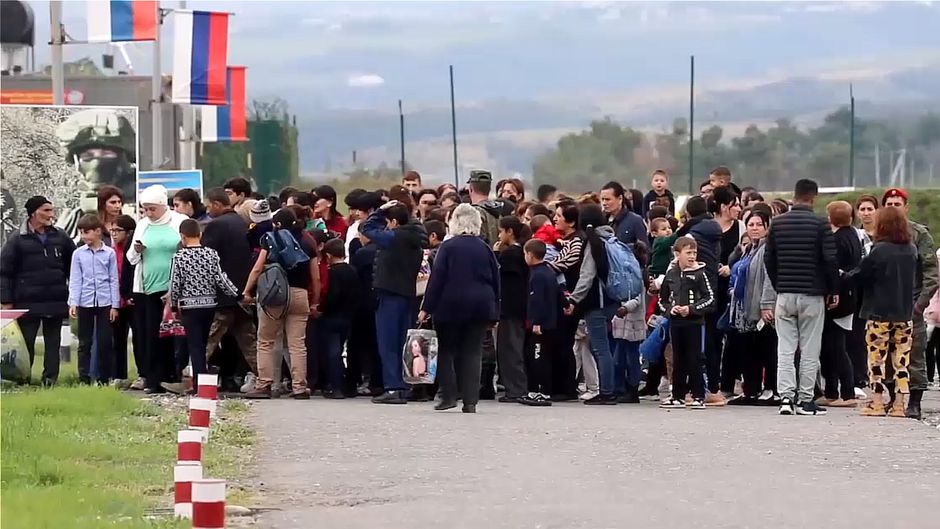Azerbaijan takes control of Nagorno-Karabakh: “The complete destruction of an ancient Christian culture”
About 100,000 have crossed the border into Armenia. The World Evangelical Alliance is concerned about the blockade of humanitarian aid in the region.
Protestante Digital · 06 OCTOBER 2023 · 10:55 CET

The dissolution of the self-proclaimed Nagorno-Karabakh republic will take place on 1 January 2024, after the takeover of the territory by Azerbaijan.
This has led to the displacement of about 100,000 Armenians living in the region (including 29,000 children), most of them of Christian background, to Armenia, leaving behind their homes and possessions, to seek refuge.
According to the United Nations mission in Nagorno-Karabakh, “between 50 and 1,000 Armenians remain in the region”. No material damage or traces of violence against the civilian population, the UN added.
On the other hand, the Armenian government, which some accuse of handing over the territory to Azerbaijan, stated that “the flow of people has mostly stopped and only officials and a limited number of the population remain in the territory”.
The final takeover of Nagorno-Karabakh by Azerbaijan comes barely a year after the latest escalation of violence in the conflict, which led to the Azeri army taking final control of the region.
Armenian Prime Minister Nikol Pashinian assured that “if the [Russian] peacekeepers have proposed a peace agreement, it means that they fully accept the responsibility to ensure the security of the Armenians of Nagorno-Karabakh and provide them with the conditions and rights to live safely on their lands and in their homes”.
From Baku, President Ilham Aliyev expressed his surprise at the Armenian executive's reaction and pointed out that “they have shown unexpected political competence".
A long-standing conflict with international interests
The territory of Nagorno-Karabakh had come under Armenian control, like the self-proclaimed largely Armenian-populated Artsakh Republic, after clashes with Azerbaijan between 1988 to 1994.
A new episode of violence in October 2020 reignited the conflict, until both sides signed a peace agreement favourable to Baku, which regained control of much of the territory.
At least 6,500 people were killed in that new escalation of violence.
However, peace lasted until September 2022, when Armenia accused Azerbaijan of shelling towns near its border, such as Goris and Vardenis, while the Azeris accused the Armenians of “subversive acts”.
The new confrontations ended months later with a clear military victory for Azerbaijan, which secured control of the region.
The Azeri government has now raised the pressure to the point of forcing the dissolution of the political entity that had been formed to govern the Armenian-controlled territory.
According to the head of the Evangelical Peace and Reconciliation Network (PRN), Johannes Reimer, “the conflict in Ukraine is occupying all our attention and Azerbaijan is delivering the badly needed gas”. This leads to “this window of opportunity president Aliev uses, to solve the ancient problem of the Armenian enclave in his country once for ever”, Reimer adds.
The small enclave of Nagorno-Karabakh has become a major player in world geopolitics. “Azerbaijan is needed for gas delivery and Turkey uses the Armenian union with Russia as an argument”, Reimer told Spanish news website Protestante Digital.
WEA concerns
Earlier, the World Evangelical Alliance (WEA) had expressed concern at the 54th session of the UN Human Rights Council over the blockade of humanitarian aid in the territory.
“We call on the government of Azerbaijan to immediately lift the blockade and to allow for unimpeded access to food, medicine and fuel”, said Wissam al-Saliby, representative of the WEA at the UN in Geneva.
Religious motivations?
In addition to the socio-political content of the conflict, which argues that one of the causes is that Nagorno-Karabakh was a region populated mostly by Armenians on Azerbaijani territory, Reimer also sees a religious component to the conflict.
Armenia is a traditionally Christian nation bordering other Muslim-majority countries, such as Turkey and Azerbaijan itself.
One of the tragic historical episodes that has gained diplomatic prominence lately is the genocide of Christian Armenians at the hands of the Ottoman Empire in 1915.
“We see the complete destruction of an ancient Christian culture”, stresses Reimer.
For the head of the PRN, “this is an ethno-political conflict in the first place, but deeply interwoven with religious issues. Yes, Christians [Armenians in Nagorno-Karabakh] are being persecuted”.
Published in: Evangelical Focus - europe - Azerbaijan takes control of Nagorno-Karabakh: “The complete destruction of an ancient Christian culture”
Since you are here…
Evangelical Focus is a news and opinion platform that brings together Christians from across Europe and other parts of the world. We need the support of our readers to make this media project sustainable in the long term. You can support our work! Read about Evangelical Focus’s sustainability here.
Would you like to support the work of Evangelical Focus?
Use one of these methods. You can also transfer your donation to “Areópago Protestante / Evangelical Focus” IBAN: ES8521000853530200278394 (Swift / BIC: CAIXESBBXXX). Subject: “Donation Evangelical Focus”
